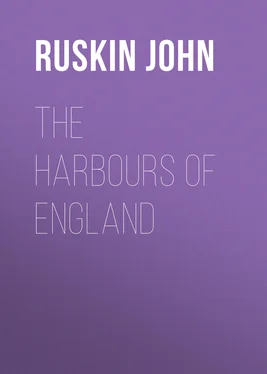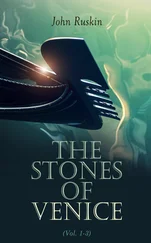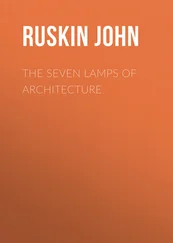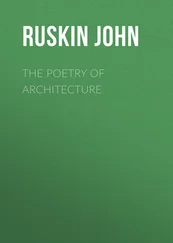John Ruskin - The Harbours of England
Здесь есть возможность читать онлайн «John Ruskin - The Harbours of England» — ознакомительный отрывок электронной книги совершенно бесплатно, а после прочтения отрывка купить полную версию. В некоторых случаях можно слушать аудио, скачать через торрент в формате fb2 и присутствует краткое содержание. Жанр: foreign_antique, foreign_home, literature_19, visual_arts, на английском языке. Описание произведения, (предисловие) а так же отзывы посетителей доступны на портале библиотеки ЛибКат.
- Название:The Harbours of England
- Автор:
- Жанр:
- Год:неизвестен
- ISBN:нет данных
- Рейтинг книги:5 / 5. Голосов: 1
-
Избранное:Добавить в избранное
- Отзывы:
-
Ваша оценка:
- 100
- 1
- 2
- 3
- 4
- 5
The Harbours of England: краткое содержание, описание и аннотация
Предлагаем к чтению аннотацию, описание, краткое содержание или предисловие (зависит от того, что написал сам автор книги «The Harbours of England»). Если вы не нашли необходимую информацию о книге — напишите в комментариях, мы постараемся отыскать её.
The Harbours of England — читать онлайн ознакомительный отрывок
Ниже представлен текст книги, разбитый по страницам. Система сохранения места последней прочитанной страницы, позволяет с удобством читать онлайн бесплатно книгу «The Harbours of England», без необходимости каждый раз заново искать на чём Вы остановились. Поставьте закладку, и сможете в любой момент перейти на страницу, на которой закончили чтение.
Интервал:
Закладка:
Then, also, it is wonderful on account of the greatness of the thing accomplished. No other work of human hands ever gained so much. Steam-engines and telegraphs indeed help us to fetch, and carry, and talk; they lift weights for us, and bring messages, with less trouble than would have been needed otherwise; this saving of trouble, however, does not constitute a new faculty, it only enhances the powers we already possess. But in that bow of the boat is the gift of another world. Without it, what prison wall would be so strong as that "white and wailing fringe" of sea. What maimed creatures were we all, chained to our rocks, Andromeda-like, or wandering by the endless shores; wasting our incommunicable strength, and pining in hopeless watch of unconquerable waves? The nails that fasten together the planks of the boat's bow are the rivets of the fellowship of the world. Their iron does more than draw lightning out of heaven, it leads love round the earth.
Then also, it is wonderful on account of the greatness of the enemy that it does battle with. To lift dead weight; to overcome length of languid space; to multiply or systematize a given force; this we may see done by the bar, or beam, or wheel, without wonder. But to war with that living fury of waters, to bare its breast, moment after moment, against the unwearied enmity of ocean,—the subtle, fitful, implacable smiting of the black waves, provoking each other on, endlessly, all the infinite march of the Atlantic rolling on behind them to their help,—and still to strike them back into a wreath of smoke and futile foam, and win its way against them, and keep its charge of life from them;—does any other soulless thing do as much as this?
I should not have talked of this feeling of mine about a boat, if I had thought it was mine only; but I believe it to be common to all of us who are not seamen. With the seaman, wonder changes into fellowship and close affection; but to all landsmen, from youth upwards, the boat remains a piece of enchantment; at least unless we entangle our vanity in it, and refine it away into mere lath, giving up all its protective nobleness for pace. With those in whose eyes the perfection of a boat is swift fragility, I have no sympathy. The glory of a boat is, first its steadiness of poise—its assured standing on the clear softness of the abyss; and, after that, so much capacity of progress by oar or sail as shall be consistent with this defiance of the treachery of the sea. And, this being understood, it is very notable how commonly the poets, creating for themselves an ideal of motion, fasten upon the charm of a boat. They do not usually express any desire for wings, or, if they do, it is only in some vague and half-unintended phrase, such as "flit or soar," involving wingedness. Seriously, they are evidently content to let the wings belong to Horse, or Muse, or Angel, rather than to themselves; but they all, somehow or other, express an honest wish for a Spiritual Boat. I will not dwell on poor Shelley's paper navies, and seas of quicksilver, lest we should begin to think evil of boats in general because of that traitorous one in Spezzia Bay; but it is a triumph to find the pastorally minded Wordsworth imagine no other way of visiting the stars than in a boat "no bigger than the crescent moon"; 9 9 Prologue to Peter Bell .
and to find Tennyson—although his boating, in an ordinary way, has a very marshy and punt-like character—at last, in his highest inspiration, enter in where the wind began "to sweep a music out of sheet and shroud." 10 10 In Memoriam , ci.
But the chief triumph of all is in Dante. He had known all manner of traveling; had been borne through vacancy on the shoulders of chimeras, and lifted through upper heaven in the grasp of its spirits; but yet I do not remember that he ever expresses any positive wish on such matters, except for a boat.
"Guido, I wish that Lapo, thou, and I,
Led by some strong enchantment, might ascend
A magic ship, whose charmed sails should fly
With winds at will where'er our thoughts might wend,
So that no change nor any evil chance
Should mar our joyous voyage; but it might be
That even satiety should still enhance
Between our souls their strict community:
And that the bounteous wizard then would place
Vanna and Bice, and our Lapo's love,
Companions of our wandering, and would grace
With passionate talk, wherever we might rove,
Our time, and each were as content and free
As I believe that thou and I should be."
And of all the descriptions of motion in the Divina Commedia , I do not think there is another quite so fine as that in which Dante has glorified the old fable of Charon by giving a boat also to the bright sea which surrounds the mountain of Purgatory, bearing the redeemed souls to their place of trial; only an angel is now the pilot, and there is no stroke of laboring oar, for his wings are the sails.
"My preceptor silent yet
Stood, while the brightness that we first discerned
Opened the form of wings: then, when he knew
The pilot, cried aloud, 'Down, down; bend low
Thy knees; behold God's angel: fold thy hands:
Now shalt thou see true ministers indeed.
Lo! how all human means he sets at nought;
So that nor oar he needs, nor other sail
Except his wings, between such distant shores.
Lo! how straight up to heaven he holds them reared,
Winnowing the air with those eternal plumes,
That not like mortal hairs fall off or change.'
"As more and more toward us came, more bright
Appeared the bird of God, nor could the eye
Endure his splendor near: I mine bent down.
He drove ashore in a small bark so swift
And light, that in its course no wave it drank.
The heavenly steersman at the prow was seen,
Visibly written blessed in his looks.
Within, a hundred spirits and more there sat."
I have given this passage at length, because it seems to me that Dante's most inventive adaptation of the fable of Charon to Heaven has not been regarded with the interest that it really deserves; and because, also, it is a description that should be remembered by every traveler when first he sees the white fork of the felucca sail shining on the Southern Sea. Not that Dante had ever seen such sails; 11 11 I am not quite sure of this, not having studied with any care the forms of mediæval shipping; but in all the MSS. I have examined the sails of the shipping represented are square.
his thought was utterly irrespective of the form of canvas in any ship of the period; but it is well to be able to attach this happy image to those felucca sails, as they now float white and soft above the blue glowing of the bays of Adria. Nor are other images wanting in them. Seen far away on the horizon, the Neapolitan felucca has all the aspect of some strange bird stooping out of the air and just striking the water with its claws; while the Venetian, when its painted sails are at full swell in sunshine, is as beautiful as a butterfly with its wings half-closed. 12 12 It is not a little strange that in all the innumerable paintings of Venice, old and modern, no notice whatever had been taken of these sails, though they are exactly the most striking features of the marine scenery around the city, until Turner fastened upon them, painting one important picture, "The Sun of Venice," entirely in their illustration.
There is something also in them that might remind us of the variegated and spotted angel wings of Orcagna, only the Venetian sail never looks majestic; it is too quaint and strange, yet with no peacock's pride or vulgar gayety,—nothing of Milton's Dalilah:
"So bedecked, ornate and gay
Like a stately ship
Of Tarsus, bound for the Isles
Of Javan or Gadire
With all her bravery on and tackle trim,
Sails filled and streamers waving."
Интервал:
Закладка:
Похожие книги на «The Harbours of England»
Представляем Вашему вниманию похожие книги на «The Harbours of England» списком для выбора. Мы отобрали схожую по названию и смыслу литературу в надежде предоставить читателям больше вариантов отыскать новые, интересные, ещё непрочитанные произведения.
Обсуждение, отзывы о книге «The Harbours of England» и просто собственные мнения читателей. Оставьте ваши комментарии, напишите, что Вы думаете о произведении, его смысле или главных героях. Укажите что конкретно понравилось, а что нет, и почему Вы так считаете.












